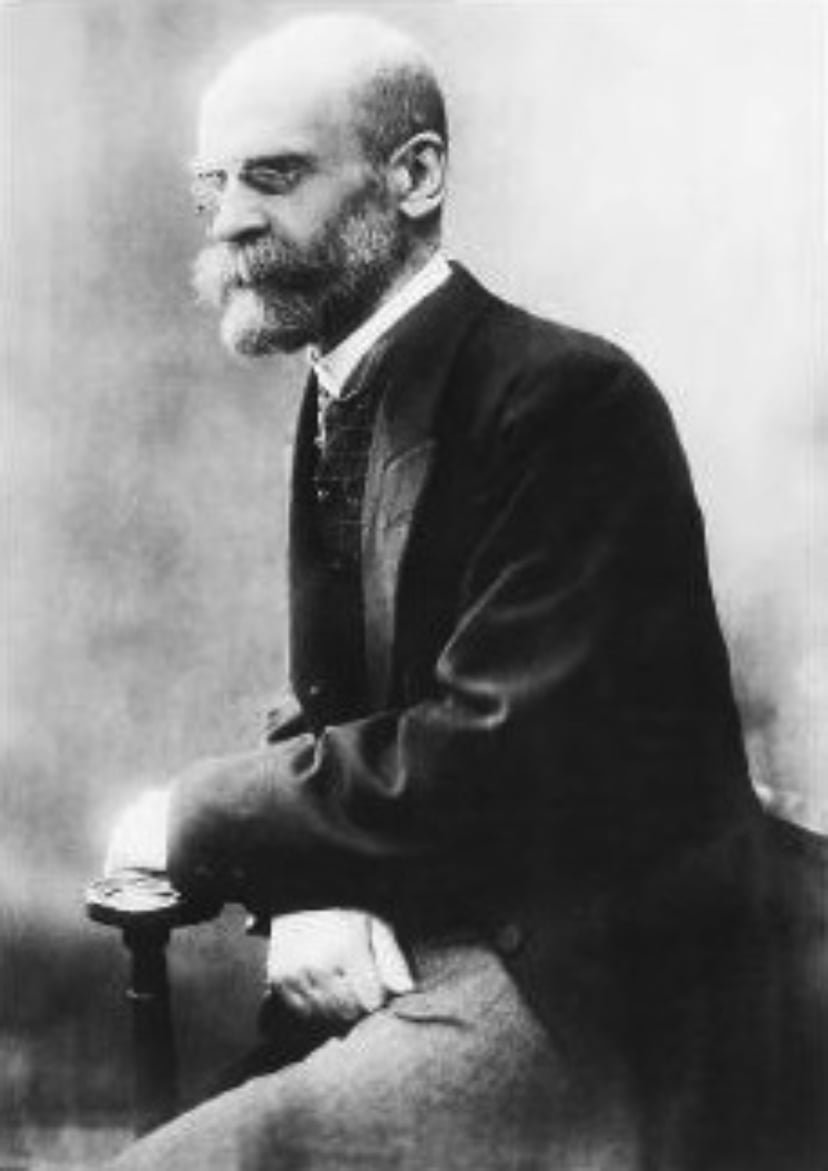

Rei Ayanami

|
綾波 レイ
|
|
|---|---|
| Personal Description | |
| Nihongo | 綾波 レイ |
| Informations | |
| Series | Neon Genesis Evangelion |
| Films | Evangelion: Death and Rebirth |
| Affiliation | NERV |
| Rank/Title | First Child |
| Age | 14 (born 30 March 2001) |
| Known Relatives | Yui Ikari (Derivative) |
| First Appearance | “Angel Attack” |
| Seiyū | Megumi Hayashibara |
| Voice Actors | Amanda Winn-Lee |
- Japanese Name: 綾波 レイ (Ayanami Rei)
- Designation: First Child, Pilot of Evangelion Unit-00
- Franchise:Neon Genesis Evangelion
|
Émile Durkheim
|
|
|---|---|
| Born |
David Émile Durkheim
15 April 1858 Épinal, France
|
| Died | 15 November 1917(aged 59)
Paris,France
|
| Nationality | French |
| Alma mater | École Normale Supérieure |
| Known for | Sacred–profane dichotomy Collective consciousness Social fact Social integration Anomie Collective effervescence |
| Scientific career | |
| Fields | Philosophy, sociology, education, anthropology, religious studies |
| Institutions | University of Paris, University of Bordeaux |
| Influences | Immanuel Kant, René Descartes,Plato, Herbert Spencer,Aristotle, Montesquieu, Jean-Jacques Rousseau, Auguste Comte. William James, John Dewey, Fustel de Coulanges, Jean-Marie Guyau, Charles Bernard Renouvier, John Stuart Mill |
| Influenced | Marcel Mauss,Claude Lévi-Strauss, Talcott Parsons, Maurice Halbwachs, Jonathan Haidt, Lucien Lévy-Bruhl,Bronisław Malinowski, Fernand Braudel, Pierre Bourdieu, Charles Taylor, Henri Bergson, Emmanuel Levinas, Steven Lukes, Alfred Radcliffe-Brown, E. E. Evans-Pritchard, Mary Douglas, Paul Fauconnet, Robert N. Bellah, Ziya Gökalp, David Bloor, Randall Collins, Neil Smelser[1] |
Appearance
Rei’s appearance is iconic and distinctive, further enhancing her mystique. She has short, pale blue hair and striking red eyes, giving her an ethereal look that sets her apart from her peers. Often seen wearing her school uniform or the Evangelion plugsuit, her look is symbolic of her dual identity—both a student and a living embodiment of Lilith. Her quiet beauty and minimalist expressions underscore her introverted nature, making her an unforgettable character within the series.

Clad in her iconic plug suit, Rei Ayanami stands poised and composed, her calm expression embodying the mystery and strength that make her an unforgettable presence in Evangelion.
Background and Role
Rei Ayanami is introduced as the enigmatic First Child and designated pilot of Evangelion Unit-00 in Neon Genesis Evangelion. Known for her quiet and detached nature, Rei is initially a mystery to both her peers and the audience. Her reserved demeanor and lack of outward emotion make her appear otherworldly, even distant, and create a sense of isolation around her character. However, as the series unfolds, her connections with the people around her—especially with Shinji Ikari—begin to surface, giving way to a gradual transformation in her personality and actions.
Personality and Development
Initially, Rei exhibits minimal emotion and responds to most interactions with calm indifference. Her stoic personality makes her difficult to approach, leading many to view her as cold or disconnected. Despite this, Rei gradually develops bonds with those around her, particularly Shinji, whose kindness and empathy begin to influence her own behavior. These relationships reveal a more vulnerable and empathetic side of Rei, culminating in her eventual willingness to make choices that defy Gendo’s expectations and support the welfare of others over her own programming.
Mysterious Origins and Role in Instrumentality
As the series progresses, Rei’s true origins are revealed, connecting her closely with the overarching plot and the hidden goals of NERV. It is ultimately disclosed that Rei is a clone, created using DNA from Yui Ikari, Shinji’s mother, as part of Gendo Ikari’s plan to manipulate the Human Instrumentality Project. Her status as both a human and a component of the Lilith entity marks her as a pivotal figure in the culmination of the series’ events, particularly in The End of Evangelion, where her role in Instrumentality becomes crucial. In these final events, she becomes both the symbol and vessel of humanity’s collective consciousness, giving Shinji the choice of whether to merge all of humanity or allow individuals to retain their own identities.
Symbolism and Legacy
Rei’s character embodies the themes of self-identity, humanity, and the search for purpose. Her dual identity as both human and a vessel of Lilith mirrors the existential questions at the heart of Evangelion. As a clone with fragmented memories, she grapples with the nature of her existence, balancing loyalty to Gendo with an emerging sense of independence. In the end, Rei’s choice to defy her creator and enable Instrumentality according to her own terms exemplifies her journey toward self-awareness and individuality.
Legacy
Rei Ayanami’s character continues to resonate with audiences as a symbol of introspection and self-discovery. Her journey from a quiet, obedient figure to an individual capable of challenging her creator represents one of Evangelion’s core messages: the importance of self-acceptance and the courage to forge one’s own path. Her role in both the TV series and The End of Evangelion cements her as a character whose impact extends beyond her enigmatic origins, leaving a lasting influence on both the Evangelion franchise and anime as a whole.
Trivia
★Symbolic Color Scheme: Rei’s pale blue and white aesthetic reflects her calm, almost ghostly presence, while her red eyes allude to her connection to the otherworldly, particularly the Angel Lilith.
★Influence in Pop Culture: Rei’s character archetype—reserved, mysterious, and ethereal—has influenced countless characters in anime, making her one of the most recognizable figures in anime history.
★Relationship with Shinji: Although subtle, Rei’s bond with Shinji allows her to express and experience emotions beyond her role as a pilot, signifying the importance of human connection in her character arc.